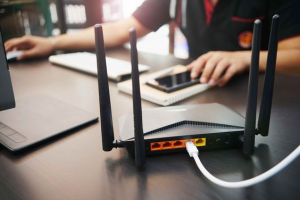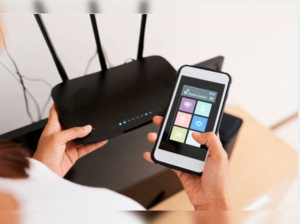What is a Network Security Key For WIFI Crucial to Connectivity
A network security key for Wi-Fi, often referred to as a Wi-Fi password or passphrase, is a security feature used to protect a wireless network from unauthorized access. It is essentially a code that needs to be entered to connect to a secured Wi-Fi network. This key is used to encrypt the data transmitted between devices and the Wi-Fi router, making it more difficult for unauthorized users to intercept or access the network.
Network security keys come in two primary forms:
WPA/WPA2-PSK Key (Pre-Shared Key): This is the most common type of network security key for personal and small business networks. It’s a password, usually consisting of a combination of letters, numbers, and symbols. When connecting to the network, you’ll be prompted to enter this key, and if it matches the one set up in the router, you’ll gain access.
WEP Key (Wired Equivalent Privacy): While less secure than WPA/WPA2, WEP keys are also used for Wi-Fi security. They consist of a string of hexadecimal digits (0-9 and A-F). However, WEP is considered relatively weak and less secure compared to WPA/WPA2, and it’s generally not recommended for use.
The network security key is essential for ensuring that only authorized users can connect to your Wi-Fi network, helping to protect your data and maintain the privacy and security of your internet connection. It’s important to choose a strong, unique security key and update it regularly to enhance network security.In the digital age, where connectivity is paramount, securing your wireless network is of utmost importance.
One of the primary ways to protect your WiFi network is by using a Network Security Key. But what exactly is a Network Security Key, and why is it crucial for the safety of your WiFi connection? In this comprehensive guide, we will explore the ins and outs of Network Security Keys, providing you with a clear understanding of their significance and how to use them effectively. Also, read about What is a Network Security Key
The Basics of Network Security
Before we delve into the specifics of Network Security Keys, let’s establish a solid foundation by understanding the basics of network security.
What Is Network Security?
Network security is the practice of implementing measures to protect a computer network infrastructure from unauthorized access, misuse, or any form of cyber threats. It involves a combination of hardware, software, policies, and user awareness.
Why Is Network Security Important?
Network security is essential for safeguarding sensitive data, ensuring the privacy of users, and preventing potential cyberattacks. Without robust network security, your data and privacy could be compromised, leading to severe consequences.
What Is a Network Security Key?
Now, let’s get to the heart of the matter—what exactly is a Network Security Key?
Types of Network Security Keys
Network Security Keys come in various types, each offering a different level of security. Here are some of the most common types:
WEP Key
The Wired Equivalent Privacy (WEP) Key is one of the earliest forms of Network Security Keys. It uses a fixed alphanumeric key, but it is now considered relatively weak and easily hackable.
WPA Key
The Wi-Fi Protected Access (WPA) Key provides better security than WEP. It utilizes more advanced encryption methods and is recommended for home networks.
WPA2 Key
WPA2 is an improvement over WPA, offering stronger encryption algorithms. It is currently one of the most secure options for Network Security Keys.
WPA3 Key
The latest standard, WPA3, introduces even more robust security features, making it the top choice for securing modern WiFi networks. For more interesting information visit our website dailyymails.com
How to Find Your Network Security Key
what is a network security key for wifi Locating your Network Security Key depends on your router type and setup. Here’s how you can typically find it:
On a Sticker
Many routers have a sticker on them that displays the default Network Security Key. This is often labeled as the “Wi-Fi Password.”
Router’s Web Interface
You can access your router’s web interface through a web browser. Log in and navigate to the wireless settings section to find or change your Network Security Key.

Changing Your Network Security Key
For enhanced security, it’s advisable to change your Network Security Key regularly. Here’s how:
Log In to Your Router
Access your router’s web interface using your browser, and enter the necessary login credentials.
Navigate to Security Settings
Find the security or wireless settings tab and locate the Network Security Key option.
Create a New Key
Generate a new, strong Network Security Key. Make it a combination of uppercase and lowercase letters, numbers, and special characters for added security.
Save Changes
Remember to save the changes before exiting the router’s settings.
The Significance of a Strong Network Security Key
Having a strong Network Security Key is essential for several reasons:
Prevent Unauthorized Access
A robust Network Security Key acts as a barrier against unauthorized users trying to connect to your WiFi network. Without it, anyone within range could potentially access your network, leading to privacy and security concerns.
Protect Sensitive Data
Network Security Keys ensure the confidentiality of your data. With the right key in place, your personal information, financial data, and other sensitive content transmitted over the network remain secure from prying eyes.
Guard Against Cyber Threats
Cyber threats are constantly evolving, and hackers are becoming increasingly sophisticated. A strong Network Security Key is your first line of defense against these threats. It makes it significantly harder for cybercriminals to breach your network.
Maintain Network Performance
Securing your network with a strong key can also help maintain network performance. Unauthorized users or devices consuming your bandwidth can slow down your connection. By using a Network Security Key, you can ensure that only approved devices access your network, preserving its speed and reliability.
Creating a Strong Network Security Key
Here are some tips for creating a strong and secure Network Security Key:
Length Matters
The longer your Network Security Key, the harder it is to crack. Aim for a minimum of 12 characters. A mix of uppercase and lowercase letters, numbers, and special characters is ideal.

Avoid Common Words
Steer clear of using easily guessable words, such as “password” or “admin.” Hackers often rely on dictionary attacks to crack simple keys.
Use Passphrases
Consider using passphrases – a sequence of random words or a meaningful sentence – as your Network Security Key. These can be both strong and easier to remember.
Change It Regularly
To enhance security, change your Network Security Key periodically. This practice can help protect your network against potential threats.
Conclusion
In the digital era, protecting your WiFi network is crucial, and a Network Security Key is your first line of defence. With various types of Network Security Keys available, you can choose the one that best suits your needs and ensures the safety of your wireless network.
FAQs
Is a Network Security Key the same as a WiFi password?
No, they are not the same. A Network Security Key is used to secure the WiFi network, while a WiFi password is used to connect devices to the network.
Can I use a simple word as my Network Security Key?
While you can use a simple word, it’s not recommended. Stronger, more complex keys provide better security for your WiFi network.
What should I do if I forget my Network Security Key?
If you forget your Network Security Key, you can often find it on the router’s sticker or by accessing the router’s web interface.
Are there any differences between a WEP and a WPA Network Security Key?
Yes, there are significant differences. WPA and WPA2 offer stronger security features compared to the older WEP standard, which is now considered less secure.
Can I use a passphrase as my Network Security Key?
Yes, you can use a passphrase as your Network Security Key. Passphrases are often easier to remember and can be highly secure if properly constructed.